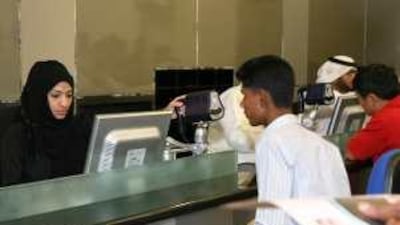ABU DHABI // More than 300,000 people deported from the UAE have been caught trying to re-enter the country by officials using iris-scanning technology introduced just over five years ago. All UAE borders and airports now use the technology, to combat smuggling, fake passports and human trafficking. In 2003, the system's first year, 4,514 people were caught trying to come back illegally; since then the totals have soared as more and more people have been added to the iris database.
Brig Gharib al Hosani, Abu Dhabi's director of airports and border security, said the people stopped were among more than one million whose unique iris scans were now stored on the database. He said they were caught trying to re-enter the country after being deported for reasons including absconding from work, criminal offences or after testing positive for diseases such as Aids. "Sometimes there are people who come by different names in their passport, but of course their irises are the same," he said, adding that the initiative had been "very successful".
The numbers of people caught show a steady climb: they reached 20,990 in 2004, 57,246 in 2006 and 122,661 in 2008, according to the airports and border security police. This year, up to Feb 11, more than 13,200 people were caught, bringing the total since the scanning technology was introduced to 331,679. Brig al Hosani declined to say which nationalities topped the list of deportees caught trying to re-enter the country.
At a security symposium in the capital last month, he published a paper outlining some of the security challenges facing officials at the UAE's 27 air, land and sea entry points. Several delegates cited the UAE's introduction of iris scanning at its borders in 2003 as a particularly successful initiative. Other countries in the Middle East are following its example. Brig Gen Mohammed al Rumaithi, the director general of security affairs and ports at Abu Dhabi Police, said the biggest challenge that port security faced was fake passports. Technologies such as iris scanning and electronic face recognition helped to overcome the problem.
Electronic face recognition was introduced at Abu Dhabi International Airport last July and Brig Gen al Rumaithi said it had enhanced security. In 2008, a total of 3,987 cases of identity fraud, arms and drug smuggling were caught in Abu Dhabi's airports and borders; 2,552 of them were at Abu Dhabi International Airport, 53 at Al Ain airport and 1,382 at the borders. Drugs topped the list of smuggling cases, but there were rare cases of arms smuggling. "Mostly people try to smuggle personal guns through the borders," said Brig Gen al Rumaithi. His department was constantly seeking to add new technologies that help increase security, as instructed by Sheikh Saif bin Zayed, Minister of Interior, he added. However, Brig Gen al Rumaithi stressed that the Government was also keen on introducing new technologies to speed up procedures for travellers.
Recently, surveillance cameras were added to Al Mudeef crossing, while iris scanning facilities have been added at Khatam al Shakla checkpoint near Al Ain. Three million passengers entered the country across various borders last year, while 728,000 vehicles entered though Khatam al Shakla and Al Ghuweifat borders. zconstantine@thenational.ae hdajani@thenational.ae


